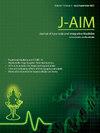Lekhan Basti和Navak Guggul对肥胖患者脂质标志物和选定基因转录效应的影响:一项单中心、开放标记、随机、比较的初步研究
IF 1.9
Q3 INTEGRATIVE & COMPLEMENTARY MEDICINE
引用次数: 0
摘要
《吠陀》推荐一种综合的修禅法。萨满疗法控制肥胖。目的本研究评估Navak Guggul和Lekhan Basti在肥胖参与者中单独和联合使用的安全性和有效性,包括人体测量学、生化水平和选定候选基因的转录谱。材料和方法经机构伦理委员会批准,进行了单中心、开放标签、随机、比较的试点研究。64名年龄在25至60岁之间、体重指数28-32.9 kg/m2、体重比(Men>;0.90和Women>;0.85)的肥胖参与者被随机分配到四组,每组16名参与者接受Navak Guggul或Lekhan Basti,单独或联合接受,或除了饮食和生活方式改变外不接受任何治疗。在基线(V1)、治疗后立即(V4)和治疗后2个月(V6)评估人体测量、阿育韦陀症状严重程度评分、体重对生活质量的影响(IWQOL)、生化测试和选定基因(UCP2、AD1POR1、FTO、GHRL、Leptin和PPARγ)的遗传表达。结果50名参与者完成了研究。所有组的参与者均表现出BMI显著降低(IV组除外),阿育吠陀症状评分显著改善。所有组的IWQOL评分在V4时均有改善,其中I组和III组的血脂下降幅度最大。转录谱分析显示,与V1相比,V4的UCP2、ADIPOR1和PPARγ基因表达增加,FTO、Ghrelin和Leptin基因表达减少。结论lekhan Basti联合治疗能有效降低人体测量指标和血脂指标。几个基因在治疗后立即出现差异表达,表明它们在肥胖管理中作为候选基因的作用。本文章由计算机程序翻译,如有差异,请以英文原文为准。
Effect of Lekhan Basti and Navak Guggul on lipid markers and transcriptional effects of selected genes in obese patients: A single-centre, open-labelled, randomized, comparative, pilot study
Background
Ayurveda recommends an integrative approach of shodhana & shamana therapy for Obesity management.
Objective
This study evaluated the safety and efficacy of Navak Guggul and Lekhan Basti, individually and in combination, with respect to anthropometric, biochemical levels and transcriptional profiling of selected candidate genes in obese participants.
Material and methods
Single-centre, open-labelled, randomized, comparative, pilot study was conducted following Institutional Ethics Committee approval. 64 obese participants of either gender, aged between 25 and 60 years with BMI 28–32.9 kg/m2 and WHR (Men>0.90 and Women>0.85) were randomly allocated to four groups, each with 16 participants, to receive either Navak Guggul or Lekhan Basti, individually or in combination or no treatment in addition to diet and lifestyle modification. Anthropometric measurements, ayurvedic symptoms severity score, impact of weight on quality of life (IWQOL), biochemical tests and genetic expressions of select genes (UCP2, AD1POR1, FTO, GHRL, Leptin and PPARγ) were assessed at baseline (V1), immediately after therapy (V4) and 2 months post-therapy (V6).
Results
50 participants completed the study. Participants from all groups showed significant reduction in BMI (except Group IV) with significant improvement in the ayurvedic symptoms score. Improvement in the IWQOL score was seen at V4 in all groups with maximal reduction in serum lipids in Groups I and III. Transcriptional profiling revealed increased expression of UCP2, ADIPOR1 and PPARγ genes at V4 and decreased expression of FTO, Ghrelin and Leptin genes compared to V1.
Conclusion
Lekhan Basti and combination therapy were beneficial in reducing anthropometric and lipid parameters. Several genes were differentially expressed immediately post-treatment suggesting their role as candidate genes in obesity management.
求助全文
通过发布文献求助,成功后即可免费获取论文全文。
去求助
来源期刊

Journal of Ayurveda and Integrative Medicine
INTEGRATIVE & COMPLEMENTARY MEDICINE-
CiteScore
4.70
自引率
12.50%
发文量
136
审稿时长
30 weeks
 求助内容:
求助内容: 应助结果提醒方式:
应助结果提醒方式:


